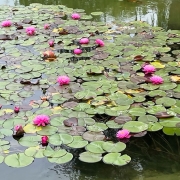The Spiritual Dilemma of Attachment
It’s common in spiritual communities for singles to be told that they can take comfort in their relationship to God. And while a lovely idea, this does not negate the very real need for human companionship. After all, God doesn’t keep us warm in bed at night. People need tactile contact and support from other humans and having coffee periodically with a friend is not the same level of intimacy as making love with someone and spending your life with that individual. So what is this neurobiological phenomenon in attachment?
Our very biology wires us for connection to ensure our survival. The minute we are born, our mothers’ bodies flood with chemicals to ensure they care for us. Oxytocin increases significantly which promotes maternal feelings and newborn attachment, in addition to reducing stress. And our attachment needs aren’t restricted to our early years. Because humans had a better chance of survival when grouped together, our neurological make up supports that we feel more pleasure and security when in relationships. When isolated, we feel less secure and more physically threatened.
How then do people cope when more isolated? This is a fundamental dilemma for people in current society. More and more people are not marrying, the divorce rate is high, and many people are not close to their families of origin. And the elderly population is typically left in isolation. Correlating to these trends, research indicates that loneliness is an epidemic in America (and was even before the pandemic).
Thankfully, it is possible to feel connected on a neurobiological level even when living alone. But it requires active efforts at connection and a redefinition of connection. Attachment can be forged in a variety of ways: through one’s breath, in communion with nature and the elements, in interactions with animals, and in meaningful friendships and community with humans. (And yes, people can go out and hook up sexually, feeling attached via all those wonderful hormones, but if the emotional connection isn’t there or the situation is abusive or neglectful, individuals might end up feeling even more alone and isolated. Because at the end of the day, we want to feel as if we consistently matter and are a part of something).
Yet even more significant, we can feel this neurological attachment with ourselves, if we are in a highly integrated state between body, mind and spirit. This not only enhances our individual well-being, it increases our abilities to connect with others when in relationship. In fact, the word “yoga” means “to unite”, which is funny because yoga is a physical practice done in quiet by oneself. There is no talking. Yet yoga describes the union of individual consciousness with universal consciousness which in essence defines attachment. Thus, it is this fusion of both the physical and the spiritual that deepens our sense of interconnectedness with others and the world around us that is so vital to our well-being and survival.
We do indeed have God. But we need to think about our neurobiology too because we are spiritual beings having a very real human experience. As a friend of mine says, “We put on our earth suits and try to learn something.” And we do that by bumping up against the world around us and experiencing its pleasures and pains.

